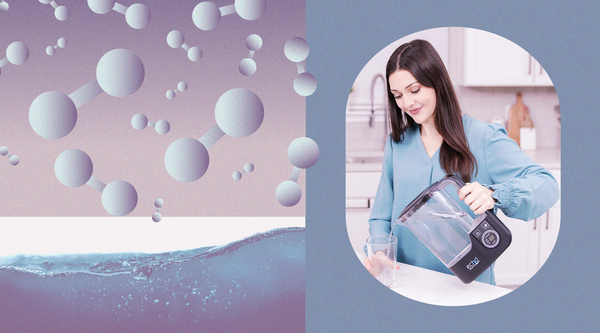We all experience stress; it’s an inevitable part of life. Stress is a natural response to deadlines, financial burdens, and everyday challenges. But in today's fast-paced world, many of us find ourselves in a constant state of fight-or-flight, our bodies perpetually flooded with stress hormones.
While short-term stress can be motivating, chronic stress wreaks havoc on our health. It weakens our immune system, disrupts sleep, and contributes to a variety of health problems. But have you ever stopped to wonder: could chronic stress literally be killing you?
The answer is yes, chronic stress can kill you. But before you get super depressed and update your will, let’s talk about how stress impacts the body and how you can combat its effects.
What is Oxidative Stress?
Before diving into the connection between stress and health, let's explore the underlying mechanism: oxidative stress. This imbalance plays a major role in how chronic stress can damage the body.
Free Radicals: Imagine tiny, unstable molecules bouncing around your cells like rogue ping pong balls. These are free radicals. They have an unpaired electron, making them highly reactive and eager to steal electrons from other molecules. While some free radicals are beneficial for specific functions, too many can wreak havoc.
The Body's Natural Production: Believe it or not, our bodies actually create free radicals as a byproduct of normal cellular processes, especially when using oxygen for energy production. This is like a controlled fire; it keeps things running, but needs careful management.
Antioxidant Defenses: Thankfully, the body isn't defenseless. We have natural antioxidants, molecules that act like firefighters, neutralizing free radicals before they can cause significant damage. For example, your body naturally produces hydrogen during digestion, which functions as a selective antioxidant. But it's a constant battle to maintain a healthy balance.

How Does Stress Contribute to Oxidative Stress?
When we're under constant pressure, our bodies go into overdrive. One of the key players here is a stress hormone called cortisol.
Cortisol's Double-Edged Sword: Cortisol plays a vital role, helping us mobilize energy to deal with stressful situations. It's like a shot of adrenaline, increasing heart rate and blood sugar to give us that fight-or-flight response. But here's the catch: chronically elevated cortisol levels, caused by long-term stress, can:
- Increase the use of oxygen for energy, leading to a surge in free radical production.
- Deplete the body's natural antioxidant stores. Imagine all the firefighters are busy tackling the initial blaze, leaving fewer to address new free radicals.
- Impair the body's ability to repair cellular damage caused by free radicals. This is like having a weakened fire brigade after a major fire.
As a result, free radicals run rampant, tipping the scales towards oxidative stress. This chronic imbalance paves the way for various health problems down the line.
Long-Term Effects of Oxidative Stress
Over time, this cellular damage accumulates, contributing to the development of various chronic health problems, including:
- Heart Disease: Oxidative stress can damage blood vessels and contribute to the buildup of plaque, increasing the risk of heart attack and stroke.
- Cancer: Free-radicals can damage DNA and lead to uncontrolled cell growth, a hallmark of cancer.
- Alzheimer's Disease and Other Neurodegenerative Disorders: Oxidative stress is thought to play a role in the degeneration of brain cells associated with these diseases.
These are just a few examples, and research continues to explore the link between oxidative stress and a wider range of health issues. The key takeaway: chronic stress, through its impact on oxidative stress, can have a profound and lasting impact on your overall health.
Can We Reduce the Effects of Oxidative Stress?
Fortunately, there's good news! We can take steps to manage stress and reduce free radical production, promoting a healthier balance in our bodies. Here are a few key strategies:
Lifestyle Changes:
- Exercise Regularly: Physical activity helps manage stress hormones and improves overall well-being.
- Eat a Healthy Diet: Fill your plate with antioxidant-rich fruits, vegetables, and whole grains.
- Prioritize Relaxation: Techniques like meditation, yoga, and deep breathing can significantly reduce stress levels.
Hydrogen Water:
Emerging research suggests that hydrogen-rich water acts as an antioxidant, helping to neutralize free radicals. Now, by adding hydrogen water to your daily routine, you can boost the antioxidants in your body and add another weapon in your anti-stress arsenal. Here’s how hydrogen water battles oxidative stress:
- Selective Scavenger: Hydrogen molecules (H2) are tiny and easily absorbed by the body. They act as selective scavengers, targeting and neutralizing harmful free radicals, particularly the highly reactive hydroxyl radical (OH-). This helps reduce the overall free radical burden and protects cells from damage.
- Anti-inflammatory Effects: Research suggests hydrogen water has anti-inflammatory properties. Since chronic inflammation contributes to oxidative stress, reducing inflammation could offer a double benefit.
It’s impossible to completely avoid stress – we know this. But that doesn’t mean it has to be a death sentence. We've seen how chronic stress disrupts the body's natural balance, leading to oxidative stress and ultimately contributing to a variety of health problems. But we also know we can fight back with stress management techniques, a healthy diet, and regular exercise. And don’t forget, replacing your normal water intake with hydrogen water is one of the easiest ways to reduce oxidative stress in your body. So, don’t wait, explore new stress management techniques, and check out some of the best hydrogen water bottles on the market and get one step closer to a healthier, happier you.







